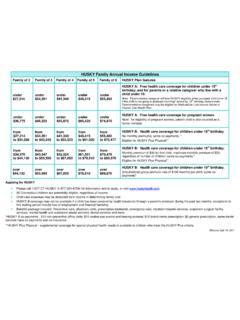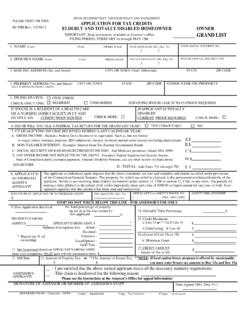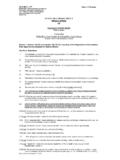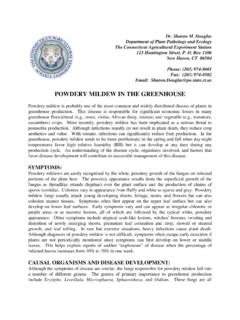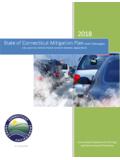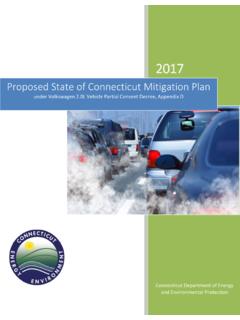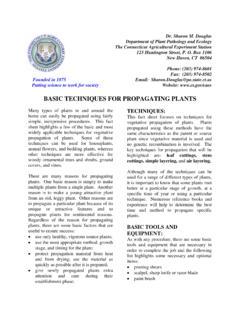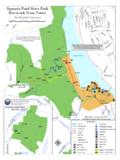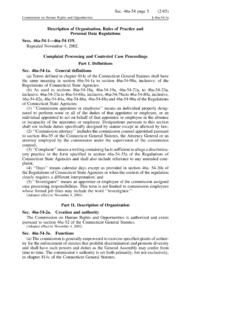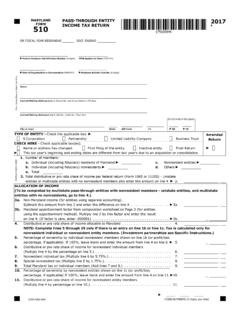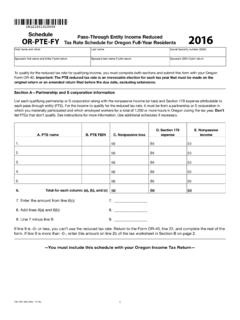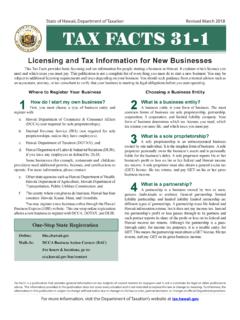Transcription of STATE OF CONNECTICUT SN 2018(4) - ct.gov
1 Page 1 of 3 STATE OF CONNECTICUT SN 2018(4) DEPARTMENT OF REVENUE SERVICES 450 Columbus Blvd Ste 1 Hartford CT 06103-1837 SPECIAL NOTICE Guidance on 2018 Estimated Payments for the Newly Enacted pass - through entity Tax Introduction: On May 31, 2018, Governor Malloy signed Public Act 18-49, which fundamentally changes how CONNECTICUT taxes income earned by partnerships and S corporations, including limited liability companies treated as partnerships and S corporations for federal income tax purposes (referred to collectively as pass - through entities ). This change is applicable to taxable years beginning on or after January 1, 2018. The legislation does not impact the taxation of publicly-traded partnerships, sole proprietorships, or single-member limited liability companies that are disregarded entities.
2 Prior to enactment of this legislation, pass - through entities were not subject to tax on their income. Instead, the partners, members or shareholders (referred to collectively as partners ) were required to pay tax on their distributive shares of the pass - through entity s income. As a general rule, partners were responsible for paying tax on their distributive share of income from a pass - through entity and typically made estimated payments for that liability. For taxable years beginning on or after January 1, 2018, a pass - through entity is now subject to tax on its own income (the pass - through entity Tax ). To account for the fact that the pass - through entity must pay tax on its own income, Public Act 18-49 provides a tax credit that partners may claim on their CONNECTICUT income tax returns and corporation business tax returns.
3 The credit is intended to ensure the pass - through entity s income is not taxed twice. 2018 Estimated Payments Required from pass - through Entities Beginning with the 2018 taxable year, a pass - through entity is required to make estimated payments against its pass - through entity Tax liability. Estimated payments for calendar year filers are due on April 15, 2018, June 15, 2018, September 15, 2018, and January 15, 2019. The law generally requires that each estimated payment equal of the pass - through entity s tax liability. Recognizing that the pass - through entity Tax was not enacted until after the April 15th due date of the first estimated payment, pass - through entities may comply with their 2018 estimated payment requirements by: Making a catch-up payment with the June 15, 2018, estimated payment that satisfies both the first and second estimated payment requirements; Making three estimated payments (by June 15, 2018, September 15, 2018, and January 15, 2019), each equal to of the tax liability (the full amount of tax remains due by the return due date); or Annualizing their estimated payments for the taxable year.
4 In addition, DRS will allow pass - through entities to re-characterize all or a portion of any April 15, 2018, June 15, 2018, or September 15, 2018, income tax estimated payments made by any of their individual partners, with such partner s consent, so that the payments are applied against the pass - through entity s 2018 estimated payment requirements. The re-characterization of these 2018 income tax estimated payments must be completed by December 31, 2018. The re-characterized amount will be deemed to have been made by the pass - through entity on the date that the individual partner remitted the estimated payment to DRS. DRS will provide information by September 30, 2018, about the mechanism to re-characterize these estimated payments. A pass - through entity may make its June 15, 2018, estimated payment by completing an estimated tax payment coupon and mailing the coupon with a check to DRS.
5 The estimated tax payment coupon is Page 2 of 3 available on the DRS website. For the September 15, 2018, estimated payment, a pass - through entity may also make its estimated payments electronically by visiting the TSC at Impact on Estimated Payments Made by Partners Resident Partners Because individual partners will get a credit for the pass - through entity Tax paid by their pass - through entity , many resident individual and trust partners will no longer need to make estimated income tax payments to cover their CONNECTICUT income tax liability arising from their pass - through entity income. A partner may still be required to make estimated income tax payments depending upon the method the pass - through entity uses to calculate the pass - through entity Tax, if the partner has income from other sources, or if the individual partner is an employee who will not have enough income tax withheld from their wages.
6 Partners should consult with their pass - through entities to determine how they will be affected. DRS is aware that some individual partners have already remitted the first-quarter estimated income tax payment, and may have scheduled the automatic payment of the second, third and fourth quarter estimated income tax payments. If an individual partner determines that he or she no longer needs to make estimated income tax payments, the partner may cancel any pending scheduled payments. If the automatic estimated income tax payments were scheduled through a third-party software, the individual partners should first try to cancel the scheduled payments through the third-party software. If the individual partners are unable to do so, then the individual partners must either contact DRS by phone at 860-297-4973 or by e-mail at to cancel payments.
7 The request must be made at least two days before the scheduled payment date. If the estimated income tax payments were scheduled through the TSC, the individual partners can log on to the TSC and cancel the scheduled payment. For estimated income tax payments that have already been made, the individual partners will have two options: 1) The individual partners will receive a refund when the partners file their 2018 CONNECTICUT income tax return; or 2) The individual partners may have all or a portion of their 2018 income tax estimated payments re-characterized so that the payments are applied against their pass - through entity s 2018 estimated payment requirements. This must be done by December 31, 2018. DRS will provide information by September 30, 2018, about the mechanism to re-characterize these estimated payments.
8 Non-Resident Partners Under prior law, pass - through entities paid composite tax on behalf of nonresident individual and trust partners at the end of the taxable year. Under the new law, the pass - through entity is required to make estimated payments during the taxable year. If the nonresident does not have any other income from CONNECTICUT sources and the pass - through entity pays its tax due, the nonresident generally is not required to file a CONNECTICUT income tax return or make estimated income tax payments. Partners should consult with their pass - through entities to determine how they will be affected. Corporations DRS anticipates that most pass - through entities controlled by corporate partners will elect the alternate method of calculating the tax, which means that the corporation will continue to pay tax on its distributive share of income from the pass - through entity .
9 If the pass - through entity is making the election, the corporation should continue to make estimated payments as it did previously. Underpayment of Estimated Tax Due to the Enactment of the pass - through entity Tax Due to the timing of the legislation, DRS recognizes that pass - through entities may inadvertently underpay their 2018 estimated payments. If a pass - through entity receives a notice from DRS that the entity may have underpaid its estimated tax for 2018, the pass - through entity may contact DRS with a written explanation describing why it failed to comply along with all supporting documentation. All documents must be submitted to DRS at the following address: Page 3 of 3 Department of Revenue Services 450 Columbus Boulevard, 11th Floor Hartford, CONNECTICUT 06103 Attn: Legal Division/PE Tax Estimates Special Note for Partners of Fiscal-Year pass - through Entities Partners in a pass - through entity that files on a fiscal year basis will likely need to continue to make 2018 estimated income tax payments.
10 The pass - through entity Tax applies to taxable years beginning on or after January 1, 2018. If a pass - through entity is a fiscal year filer, the distributive share of the partner s pass - through entity s income from the pass - through entity s 2018 return will be included in such partner s 2019 income tax return. Therefore, the credit associated with the pass - through entity s 2018 return will not be claimed until the partner s 2019 CONNECTICUT income tax return. Effective Date: Upon issuance. Statutory Authority: 2018 Conn. Pub. Acts 18-49. Effect on Other Documents: None. Effect of This Document: A Special Notice announces a new policy or practice in response to changes in STATE or federal laws or regulations or to judicial decisions. A Special Notice indicates an informal interpretation of CONNECTICUT tax law by the Department of Revenue Services (DRS).
